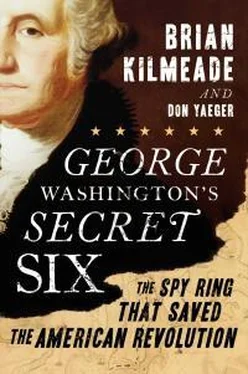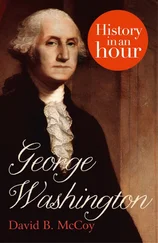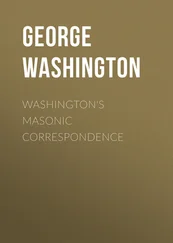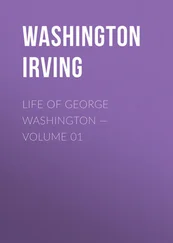Unfortunately for the rough-hewn Patriot army, spying required far more accuracy and delicacy than simply aiming a cannon, and it also took more time. Unlike waging a traditional battle, wherein two armies took to a field and fired at each other for several hours or days until one side declared victory, gathering useful intelligence might take weeks or months before combat even began. Developing the sophistication and buying the time necessary to grow an effective spy ring would be difficult—especially in the locations where it mattered most.
Recognizing the difficulty of setting up a good espionage network, Washington began converting his wartime strategy from relying on nonexistent combat strength to placing his trust in intelligence gathering even before the catastrophic loss of New York was complete. To begin, he needed one good man.
NATHAN HALE STEPS FORWARD
Captain Nathan Hale felt his heart leap when he learned of General Washington’s request that September. The general needed a man to venture behind enemy lines disguised as a Loyalist. He would make casual inquiries and investigations into the troop movements and supply stores and report back to Washington. His work would inform the general’s plans to take back New York City, its harbor, and the neighboring areas.
Lieutenant Colonel Thomas Knowlton had assembled a select group of officers to inform them of the need. Each was brave, each was trustworthy, and each was silent as he stood before them asking for a volunteer. Finally, twenty-one-year-old Nathan Hale stepped forward.
“Are you a native of Long Island?” Colonel Knowlton questioned the eager young man as they met in Knowlton’s makeshift office to discuss the particulars of the mission.
“No, sir. Coventry, Connecticut, and from there to Yale College.”
“Then you must have visited Long Island as a boy?”
“No, sir. I have never been, though I do have some distant cousins there.” Hale neglected to add that those cousins were Loyalists, rightly assuming such information would give no boost to his petition.
“Have you even a passing familiarity with the land? Perhaps from studying its geography or the surveyors’ charts?”
“Well, sir, my good friend from college, Lieutenant Benjamin Tallmadge, often urged me to visit his family there during the summer and sometimes showed me on maps where his home was located and which were the best coves for watching the ships come in.”
“Nothing more?”
“No, sir.”
The colonel shifted in his camp chair. This interview was growing uncomfortable. “How did you occupy your time at Yale?”
“With my studies, astronomy, debates—and theatricals, sir.”
Theatricals. Well, that was something, Knowlton thought. At least Hale would have some ability to assume a role and play it convincingly. Then again, he also knew that college plays tended to be either overwrought classical dramas of the Greeks and Romans or else hilarious farces featuring boisterous young actors more interested in laughing as their friends donned ladies’ dresses and wigs than in conveying any part of an intelligible story.
“I see that your unit of the Connecticut militia participated in the victorious Siege of Boston last year; am I correct to assume, then, that you are a seasoned soldier acquainted with the deprivations of supplies and the stress of battle?”
Hale blinked rapidly and color rose in his face. “No, sir. I was a schoolmaster in New London and my teaching contract did not end until that July. The siege was already over by the time I was released from my obligations. I have been involved in some small actions, but nothing of much significance. However”—he fumbled in his pocket and drew out a letter—“Lieutenant Tallmadge took it upon himself to write to me last summer when I was preparing to leave the school and join up with the Seventh Connecticut Regiment, and his words . . . well, they inspired me, sir.”
The older man eyed Hale warily. That Tallmadge was a rising star in the Continental Army was undeniable, but Tallmadge’s own shrewdness and ability did not automatically transfer to his idealistic young friend. “What did he say that could have possibly stirred your soul so much that you would volunteer to be the lone operative in a dangerous mission?”
“With your permission, sir?” Hale held up the letter.
Knowlton nodded.
“‘I am informed that you are honored by the Assembly with a Lieutenant’s commission,’” Hale began reading in a clear, strong voice that both surprised and impressed his lone audience member. Maybe the young man had been a promising thespian on the Yale stage after all. “‘I think the more extensive Service would be my choice. Our holy Religion, the honour of our God, a glorious country, & a happy constitution is what we have to defend. Some indeed may say there are others who may supply your place. True there are men who would gladly accept such a proposal but are we certain that they would be likely to answer just as good an end? . . . We all should be ready to step forth in the common cause.’”
The taper on the wax candle atop Knowlton’s desk sputtered a little as tiny flecks of ash fell onto the wood; otherwise, the room was silent. He weighed the conflicting thoughts in his mind. Hale certainly seemed intelligent, if wet behind the ears, and his conviction was undeniable and moving—inspiring, even. True, he knew nothing of Long Island, but a quick study on local geography and customs would be sufficient. Besides, who else had stepped up? There were no other volunteers as far as he knew, and Washington needed his man as quickly as possible. “You truly believe you can do this?”
“I have no doubt, sir, that I am the right man.”
“And you have no concerns about espionage being a breach of honor?”
Hale took a deep breath, then voiced a sentiment he had clearly been mulling for some time: “I wish to be useful, and every kind of service necessary to the public good becomes honorable by being necessary. If the exigencies of my country demand a peculiar service, its claims to the performance of that service are imperious.”
Knowlton hid a smile at the earnestness of this prepared speech but had to admire Hale’s seriousness. “How soon can you travel, Lieutenant?”
Hale grinned. “Right away, sir.”
“I shall inform General Washington of the fact, and of your eagerness to undertake the task at hand.” Colonel Knowlton rose to his feet, closing the interview. “Speak to no one of our meeting. You will be called upon in due time if needed. You are dismissed.”
With a sharp salute, Hale turned on his heel and strode buoyantly out the door.
AN ARMY OF ONE
Washington immediately approved Hale’s assignment. On September 12, the young man was ferried across the water from Stamford, Connecticut, to Long Island. He would pose as a schoolmaster looking for work, a cover that would give him an excuse to meet leading townsmen and ask questions about the area.
But the move was too late. As September advanced, so had the British troops, capturing the lower end of Manhattan on September 15, just three days after Hale landed. The defeat had been inevitable and Washington was prepared for the blow, but the timing could not have been worse.
Hale had little chance to establish his identity, let alone transmit any helpful intelligence to Washington, before the attack came and changed the entire purpose of his mission. Instead of gathering clues for how the Americans might defend their last stronghold, he now had to equip them with the knowledge of how they might win back the city. Washington feared the fledgling spy would not be able to adapt.
Not that Washington hadn’t been impressed with Hale. Quite the opposite, in fact. The passion, boldness, and just a touch of cockiness that Hale had demonstrated seemed to Washington to perfectly encapsulate the Patriot movement. But just as many questioned the wisdom of the Americans’ challenge to the British Crown, Washington, too, found himself wondering whether Hale’s fervor, while certainly admirable, was not also a little naive. Did he really know what he was getting into? Then again, did any of them? The Americans had yanked the lion’s mane, and now Hale had walked into one of its lairs.
Читать дальше












